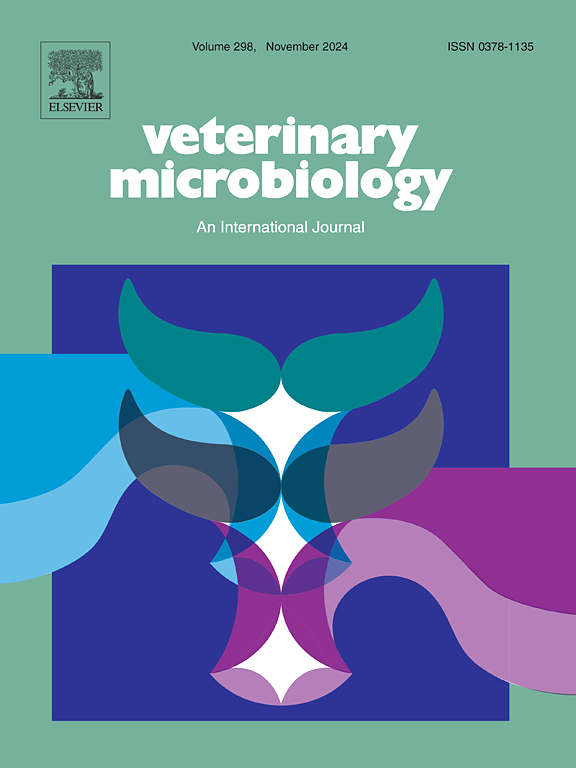转录因子OxyR调节过氧化物酶水平,增强布鲁氏菌对氧化应激的防御
IF 2.7
2区 农林科学
Q3 MICROBIOLOGY
引用次数: 0
摘要
宿主防御系统产生高水平的氧化产物,包括活性氧(ROS)和活性氮(RNS),它们会破坏细菌的代谢并发挥致命作用。至关重要的是,布鲁氏菌通过上调抗氧化酶(如超氧化物歧化酶、过氧化氢酶和过氧化物酶)来抵消氧化应激。这种防御的核心是OxyR,一种过氧化物感应转录调节剂,协调抗氧化酶的表达以减轻氧化损伤。为了确定OxyR在布鲁氏菌稳态和宿主相互作用中的作用,我们构建了OxyR缺失,并利用同源重组对菌株进行了补充。我们的研究评估了OxyR对生长、应激反应(特别是氧化应激)、细胞内存活和宿主炎症调节的影响。结果表明,氧还原缺失导致植株生长迟缓,对酸胁迫、多粘菌素B和氧化应激的耐受性降低,同时下调关键抗氧化酶的表达和活性。尽管小鼠巨噬细胞的细胞内存活不受影响,但oxyR缺失实质上抑制了关键炎症细胞因子的表达。综上所述,OxyR对最佳生长和抗逆性至关重要,在减轻氧化损伤和调节宿主炎症反应方面表现出双重功能。这些发现为布鲁氏菌免疫逃避策略提供了新的见解。本文章由计算机程序翻译,如有差异,请以英文原文为准。
Transcription factor OxyR regulates peroxidase levels to enhance Brucella's defense against oxidative stress
The host defense system produces high levels of oxidation products, including reactive oxygen species (ROS) and reactive nitrogen species (RNS), which disrupt bacterial metabolism and exert lethal effects. Crucially, Brucella counteracts oxidative stress by upregulating antioxidant enzymes—such as superoxide dismutase, catalase, and peroxidase. Central to this defense is OxyR, a peroxide-sensing transcriptional regulator that orchestrates antioxidant enzyme expression to mitigate oxidative damage. To define OxyR's role in Brucella homeostasis and host interactions, we constructed oxyR deletion and complemented strains using homologous recombination. Our study evaluated OxyR's impact on growth, stress responses (particularly oxidative stress), intracellular survival, and modulation of host inflammation. Results revealed that oxyR deletion caused significant growth retardation and reduced tolerance to acid stress, polymyxin B, and oxidative stress, concurrently downregulating both expression and activity of key antioxidant enzymes. Although intracellular survival within murine macrophages remained unaffected, oxyR deletion substantially suppressed critical inflammatory cytokine expression. In summary, OxyR is essential for optimal growth and stress resistance, exhibiting dual functionality in mitigating oxidative damage and modulating host inflammatory responses. These findings provide novel insights into Brucella immune evasion strategy.
求助全文
通过发布文献求助,成功后即可免费获取论文全文。
去求助
来源期刊

Veterinary microbiology
农林科学-兽医学
CiteScore
5.90
自引率
6.10%
发文量
221
审稿时长
52 days
期刊介绍:
Veterinary Microbiology is concerned with microbial (bacterial, fungal, viral) diseases of domesticated vertebrate animals (livestock, companion animals, fur-bearing animals, game, poultry, fish) that supply food, other useful products or companionship. In addition, Microbial diseases of wild animals living in captivity, or as members of the feral fauna will also be considered if the infections are of interest because of their interrelation with humans (zoonoses) and/or domestic animals. Studies of antimicrobial resistance are also included, provided that the results represent a substantial advance in knowledge. Authors are strongly encouraged to read - prior to submission - the Editorials (''Scope or cope'' and ''Scope or cope II'') published previously in the journal. The Editors reserve the right to suggest submission to another journal for those papers which they feel would be more appropriate for consideration by that journal.
Original research papers of high quality and novelty on aspects of control, host response, molecular biology, pathogenesis, prevention, and treatment of microbial diseases of animals are published. Papers dealing primarily with immunology, epidemiology, molecular biology and antiviral or microbial agents will only be considered if they demonstrate a clear impact on a disease. Papers focusing solely on diagnostic techniques (such as another PCR protocol or ELISA) will not be published - focus should be on a microorganism and not on a particular technique. Papers only reporting microbial sequences, transcriptomics data, or proteomics data will not be considered unless the results represent a substantial advance in knowledge.
Drug trial papers will be considered if they have general application or significance. Papers on the identification of microorganisms will also be considered, but detailed taxonomic studies do not fall within the scope of the journal. Case reports will not be published, unless they have general application or contain novel aspects. Papers of geographically limited interest, which repeat what had been established elsewhere will not be considered. The readership of the journal is global.
 求助内容:
求助内容: 应助结果提醒方式:
应助结果提醒方式:


